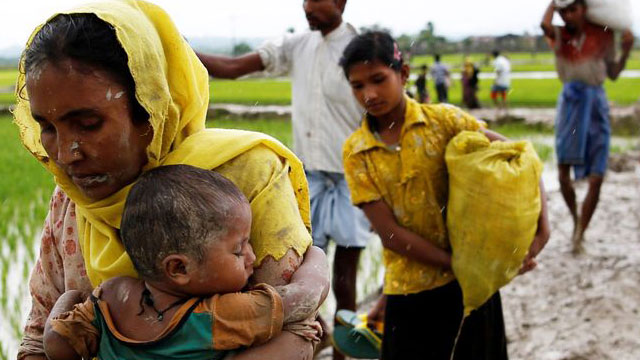Dhaka, Feb 26 (Just News): Three female Nobel laureates are visiting the Rohingya camps in Cox’s Bazar as part of their mission to assess on the ground the crisis of the Rohingya, especially the women, who faced tortures by the Myanmar security forces before they fled to Bangladesh and raise voice for justice.
The female Nobel Peace laureates -- Iran's Shirin Ebadi, Yemen's Tawakkol Karman and Northern Ireland's Mairead Maguire – visited the Rohingya camps in Kutupalong and Balukhali and talked to the women.
“Here we saw first-hand the situation and conditions affecting the Rohingya refugees. Many of the people we spoke to came to Bangladesh 6 months ago after August 2017 attacks,” said Nobel Women in its Facebook post.
“They shared with us many stories of violence, men being murdered, houses burned, rape, and brave women fleeing across the river with their children on their backs,” it said.
They also visited the office of Bangladesh’s Refugee, Relief and Repatriation Commissioner (RRRC) in Cox’s Bazar and had a discussion with RRRC Abul Kalam today morning, on the second day of their weeklong visit to the refugee camps.
“We’re mtg #Bangladesh Commissioner Kalam, Relief & Repatriation hearing abt progress& challenges hosting 700k #refugees,” tweeted Liz Bernstein, director of the Nobel Women’s Initiative, a platform of six female peace laureates established in 2006, today.
She said they discussed about the challenges of the refugees in the camps and got to learn that there are environmental risks, including flashflood and cyclones as the monsoon season is approaching in Bangladesh.
About 700,000 Rohingya Rohingya Muslims have fled army-led violence in Buddhist-majority Myanmar since late August and are living in Bangladeshi refugee camps. Myanmar's security forces have been accused of atrocities against the Rohingya, including killing, rape and arson. The United Nations and the United States have described the army crackdown as "ethnic cleansing."
In an email to The Associated Press on Saturday, Karman said on Saturday she and her colleagues were standing "in solidarity with displaced Rohingya women and calling for Rohingya women's voices to be heard."
She said Rohingya women are twice victimized — for being Rohingya and for being women — and "are affected by the ethnic cleansing and are also subject to high levels of sexual and gender-based violence."
"Rohingya women's unique needs are largely unmet in refugee camps in Bangladesh," she said. "Less than 20 percent of displaced Rohingya women who have survived sexual violence have access to post-rape care."
Karman said Saturday that "accountability and justice" for crimes against the Rohingya people must be a priority for the international community.
"The refugee problem stems from the crimes against humanity being committed by the Myanmar military and government against the Rohingya," she said in the email.
The laureates will meet Bangladeshi Prime Minister Sheikh Hasina and other officials and volunteers during their trip.
(Justnews/ys/1500hr)





